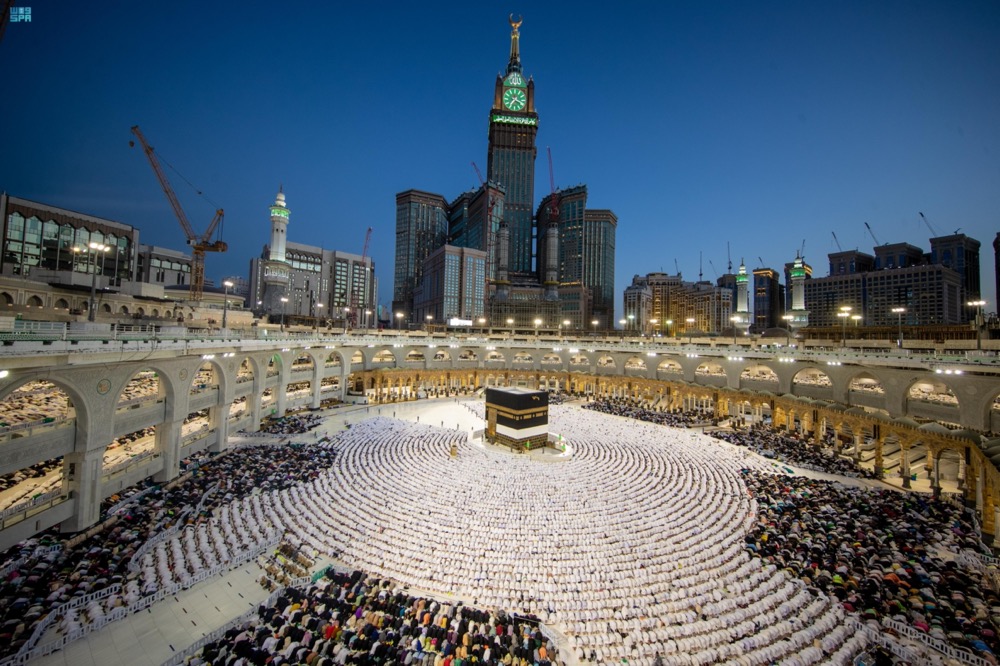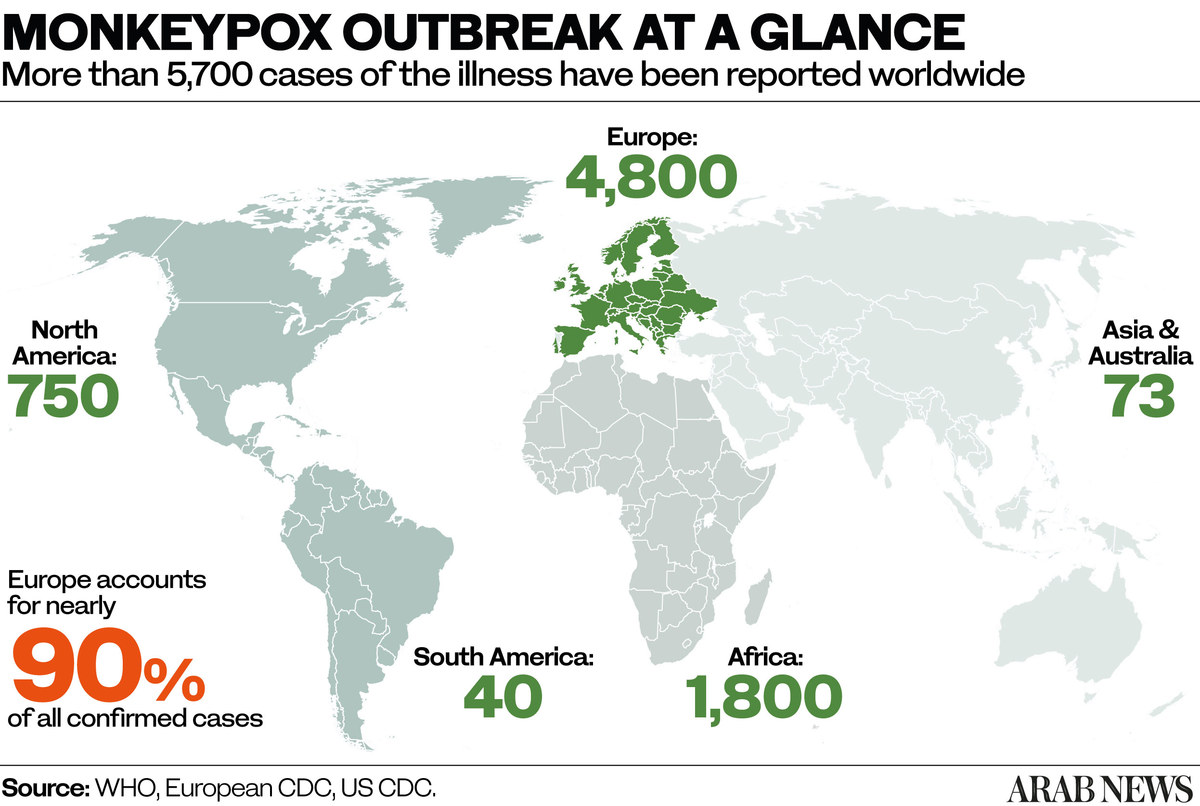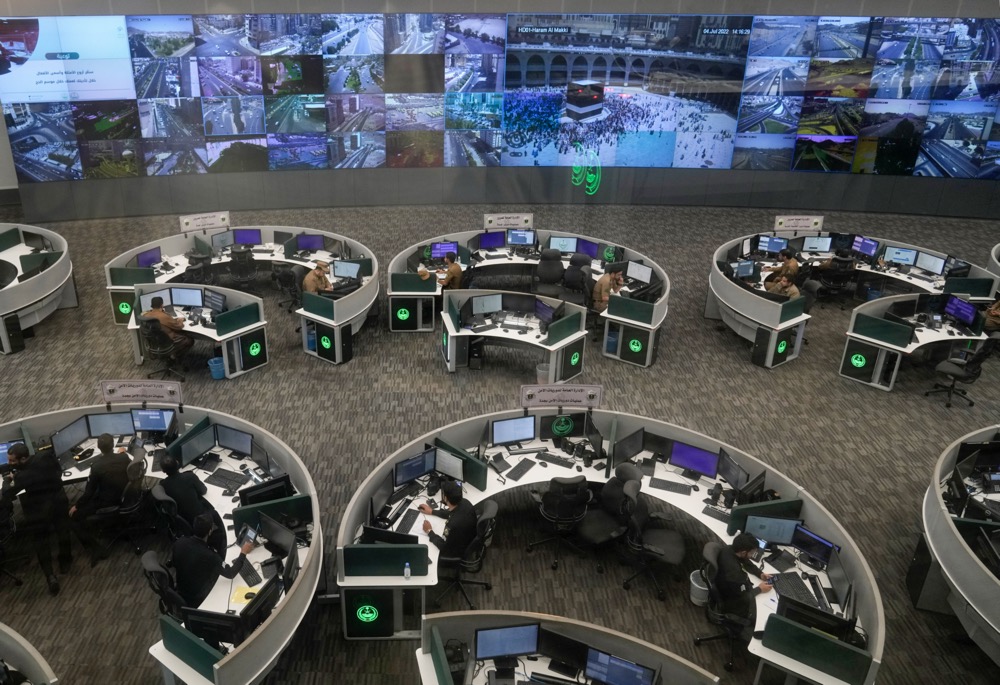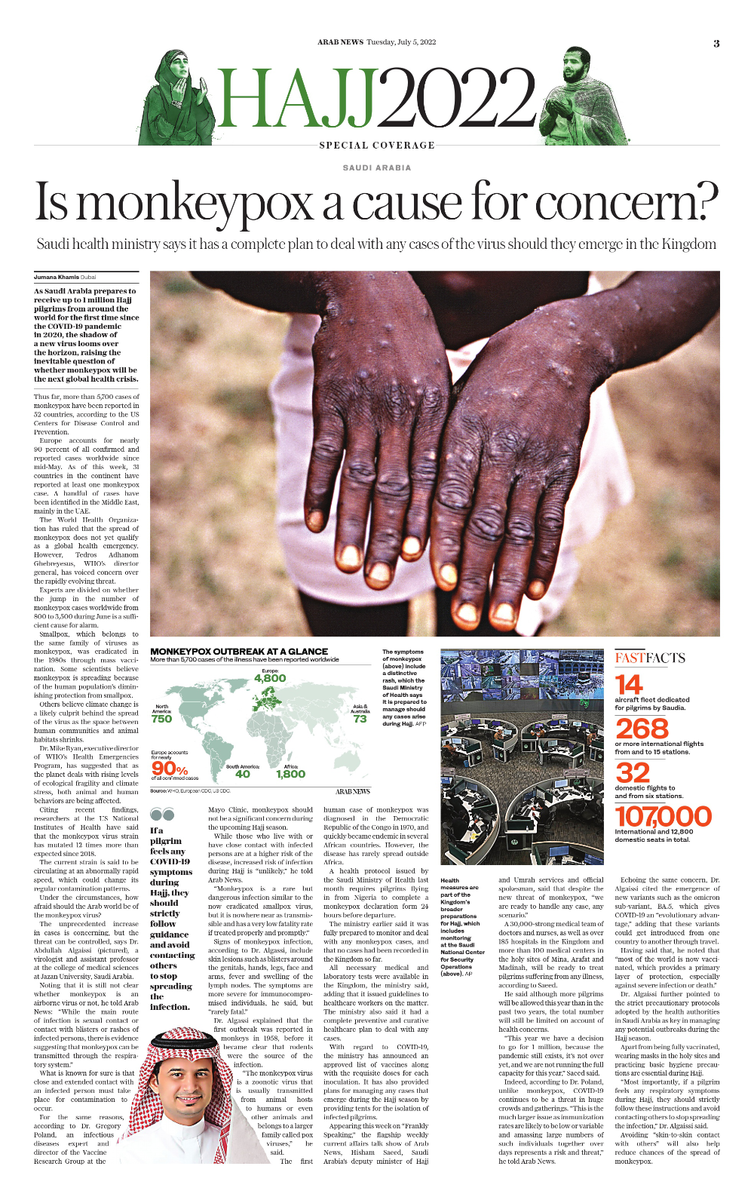DUBAI: As Saudi Arabia prepares to receive up to 1 million Hajj pilgrims from around the world for the first time since the COVID-19 pandemic in 2020, the shadow of a new virus looms over the horizon, raising the inevitable question of whether monkeypox will be the next global health crisis.
Thus far, more than 5,700 cases of monkeypox have been reported in 52 countries, according to the US Centers for Disease Control and Prevention.
Europe accounts for nearly 90 percent of all confirmed and reported cases worldwide since mid-May. As of this week, 31 countries in the continent have reported at least one monkeypox case. A handful of cases have been identified in the Middle East, mainly in the UAE.
The World Health Organization has ruled that the spread of monkeypox does not yet qualify as a global health emergency. However, Tedros Adhanom Ghebreyesus, WHO’s director general, has voiced concern over the rapidly evolving threat.

Up to 1 million Hajj pilgrims from around the world will partake in religious rites this year. (SPA)
Experts are divided on whether the jump in the number of monkeypox cases worldwide from 800 to 3,500 during June is a sufficient cause for alarm.
Smallpox, which belongs to the same family of viruses as monkeypox, was eradicated in the 1980s through mass vaccination. Some scientists believe monkeypox is spreading because of the human population’s diminishing protection from smallpox.
Others believe climate change is a likely culprit behind the spread of the virus as the space between human communities and animal habitats shrinks.
Dr. Mike Ryan, executive director of WHO’s Health Emergencies Program, has suggested that as the planet deals with rising levels of ecological fragility and climate stress, both animal and human behaviors are being affected.
Citing recent findings, researchers at the US National Institutes of Health have said that the monkeypox virus strain has mutated 12 times more than expected since 2018.
The current strain is said to be circulating at an abnormally rapid speed, which could change its regular contamination patterns.

Under the circumstances, how afraid should the Arab world be of the monkeypox virus?
The unprecedented increase in cases is concerning, but the threat can be controlled, says Dr. Abdullah Algaissi, a virologist and assistant professor at the college of medical sciences at Jazan University, Saudi Arabia.
Noting that it is still not clear whether monkeypox is an airborne virus or not, he told Arab News: “While the main route of infection is sexual contact or contact with blisters or rashes of infected persons, there is evidence suggesting that monkeypox can be transmitted through the respiratory system.”
What is known for sure is that close and extended contact with an infected person must take place for contamination to occur.
For the same reasons, according to Dr. Gregory Poland, an infectious diseases expert and director of the Vaccine Research Group at the Mayo Clinic, monkeypox should not be a significant concern during the upcoming Hajj season.
While those who live with or have close contact with infected persons are at a higher risk of the disease, increased risk of infection during Hajj is “unlikely,” he told Arab News.

Dr. Gregory Poland, an infectious diseases expert and director of the Vaccine Research Group at the Mayo Clinic. (Supplied)
“Monkeypox is a rare but dangerous infection similar to the now eradicated smallpox virus, but it is nowhere near as transmissible and has a very low fatality rate if treated properly and promptly.”
Signs of monkeypox infection, according to Dr. Algassi, include skin lesions such as blisters around the genitals, hands, legs, face and arms, fever and swelling of the lymph nodes. The symptoms are more severe for immunocompromised individuals, he said, but “rarely fatal.”
Dr. Algassi explained that the first outbreak was reported in monkeys in 1958, before it became clear that rodents were the source of the infection.
“The monkeypox virus is a zoonotic virus that is usually transmitted from animal hosts to humans or even other animals and belongs to a larger family called pox viruses,” he said.
The first human case of monkeypox was diagnosed in the Democratic Republic of the Congo in 1970, and quickly became endemic in several African countries. However, the disease has rarely spread outside Africa.

A monkeypox virion obtained from a clinical sample associated with the 2003 prairie dog outbreak. (AFP)
A health protocol issued by the Saudi Ministry of Health last month requires pilgrims flying in from Nigeria to complete a monkeypox declaration form 24 hours before departure.
The ministry earlier said it was fully prepared to monitor and deal with any monkeypox cases, and that no cases had been recorded in the Kingdom so far.
All necessary medical and laboratory tests were available in the Kingdom, the ministry said, adding that it issued guidelines to healthcare workers on the matter. The ministry also said it had a complete preventive and curative healthcare plan to deal with any cases.
With regard to COVID-19, the ministry has announced an approved list of vaccines along with the requisite doses for each inoculation. It has also provided plans for managing any cases that emerge during the Hajj season by providing tents for the isolation of infected pilgrims.
FASTFACTS
FASTFACTS • Saudia has dedicated a fleet of 14 aircraft for pilgrims.
• More than 268 international flights from and to 15 stations.
• 32 domestic flights to and from six stations.
• 107,000 International and 12,800 domestic seats in total.
• Pilgrims are flown to King Abdulaziz International Airport in Jeddah or Prince Mohammed bin Abdulaziz International Airport in Madinah.
Appearing this week on “Frankly Speaking,” the flagship weekly current affairs talk show of Arab News, Hisham Saeed, Saudi Arabia’s deputy minister of Hajj and Umrah services and official spokesman, said that despite the new threat of monkeypox, “we are ready to handle any case, any scenario.”
A 30,000-strong medical team of doctors and nurses, as well as over 185 hospitals in the Kingdom and more than 100 medical centers in the holy sites of Mina, Arafat and Madinah, will be ready to treat pilgrims suffering from any illness, according to Saeed.
He said although more pilgrims will be allowed this year than in the past two years, the total number will still be limited on account of health concerns.

Dr. Abdullah Algaissi, a virologist and assistant professor at the college of medical sciences at Jazan University. (Supplied)
“This year we have a decision to go for 1 million, because the pandemic still exists, it’s not over yet, and we are not running the full capacity for this year,” Saeed said.
Indeed, according to Dr. Poland, unlike monkeypox, COVID-19 continues to be a threat in huge crowds and gatherings. “This is the much larger issue as immunization rates are likely to be low or variable and amassing large numbers of such individuals together over days represents a risk and threat,” he told Arab News.
Echoing the same concern, Dr. Algaissi cited the emergence of new variants such as the omicron sub-variant, BA.5, which gives COVID-19 an “evolutionary advantage,” adding that these variants could get introduced from one country to another through travel.
Having said that, he noted that “most of the world is now vaccinated, which provides a primary layer of protection, especially against severe infection or death.”

Health measures are part of the Kingdom’s broader preparations for Hajj, which includes monitoring at the Saudi National Center for Security Operations. (AP)
Dr. Algaissi further pointed to the strict precautionary protocols adopted by the health authorities in Saudi Arabia as key in managing any potential outbreaks during the Hajj season.
Apart from being fully vaccinated, wearing masks in the holy sites and practicing basic hygiene precautions are essential during Hajj.
“Most importantly, if a pilgrim feels any respiratory symptoms during Hajj, they should strictly follow these instructions and avoid contacting others to stop spreading the infection,” Dr. Algaissi said.
Avoiding “skin-to-skin contact with others” will also help reduce chances of the spread of monkeypox.































